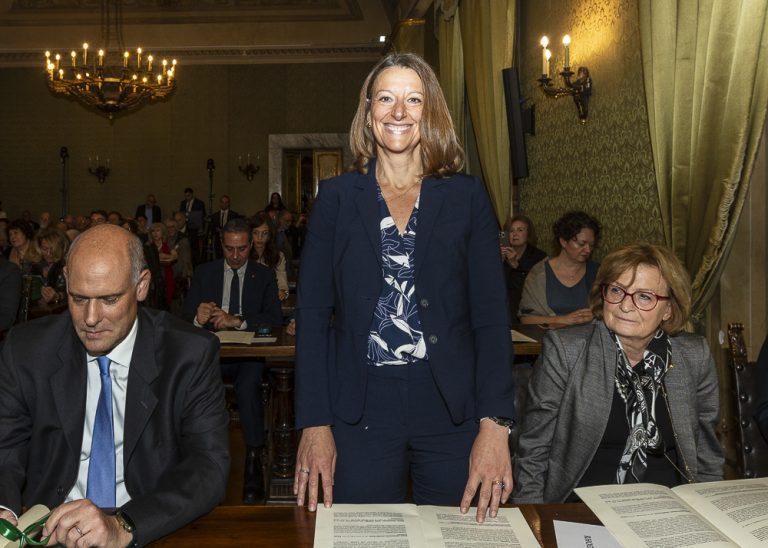An Italian academy that once counted among its ranks pioneering astronomer Galileo Galilei has recognized a Michigan State University researcher whose ambitions extend beyond Earth’s orbit.
Professor Emeritus, Michigan State University Federica Brandizzi received the Professor Luigi Tartufari Prize awarded by the National Lincei Academy in November. The ceremony took place in Rome, Italy, in the historic setting Corsini Palace on November 7.
“As a scholar of Italian heritage, the legacy of the Academy has always been a source of pride and inspiration,” Brandizzi said. “This award constitutes an incredible bridge between my professional activities and a cultural institution that symbolizes excellence in science and the arts. »
When in Rome
The Professor Luigi Tartufari Prizes are awarded to researchers who have made a significant impact in their field. Eligible disciplines range from astronomy and geophysics to philosophy and literature. Brandizzi received the 2024 Prize in Molecular, Cellular and Evolutionary Biology.
The four awards presented in 2024 each came with a prize of €25,000.
“I am pleased to see one of MSU’s most productive and innovative researchers receive an award from a renowned international institution,” said Eric Hegg, dean of the College of Natural Sciences. “MSU’s work doesn’t just happen in East Lansing. Working with partners around the world is an essential part of impactful projects that provide solutions to global problems. International awards like the one given by Federica play an important role in creating meaningful and productive international collaborations and enhancing MSU’s global reputation.
Brandizzi, who holds a joint position within the MSU-DOE Plant Research Laboratory and the Department of Plant Biologyfirst joined MSU in 2006. Over the past two decades, she and her lab have led the charge toward several frontiers in plant science, including organelle biology, biofuels research, and space biology.
“This prestigious award recognizing Federica’s outstanding research program is well deserved,” noted Andrea Case, fellow plant biologist and chair of the Department of Plant Biology. “She has trained and mentored literally hundreds of researchers during her time at MSU, including some of our most engaged students in the plant biology doctoral program. We celebrate this award with her and are fortunate to have her in the plant science research community. »
Starting a Legacy
This award recognizes Brandizzi’s career-long innovation and impact on plant biology; particularly concerning his research on methods of plant adaptation to environmental stresses.
Brandizzi pioneered research from the microscopic to the global scale. His work has revealed the internal processes and structures of plants, using cutting-edge confocal microscopy techniques to better understand the functioning of plant cell organelles.
In turn, Brandizzi has harnessed this greater understanding to help address global challenges, hoping to engineer plants that will serve as tougher, more nutritious foods, as well as more efficient biofuels.
Brandizzi sees this award as recognition of the potential of his work to address these global challenges – including advances that will help secure the world’s food supply against the stresses of climate change.
“This highlights the global relevance of our research and validates my lab’s efforts to address pressing challenges in plant biology, sustainability and human health.” It is also a tribute to the collective efforts of my team and my collaborators, who share in this success,” she said.
Soar
Among Brandizzi’s research efforts was a recent project aboard NASA’s Artemis I – the agency’s first lunar foray since the Apollo era. While the main objective of the mission was to test several systems for future manned missions, the craft carried within it a number of space science experiments.
Among the science missions aboard the spacecraft was Brandizzi’s Seed Experiment; a project designed to explore how plants could be grown in space, to support astronauts on long-haul journeys – or even feed those who might land on our cosmic neighbors. For this work, Brandizzi received the NASA Silver Group Achievement Award for the project, whose official title was the Bioexperiment-01 Artemis 1 mission.
The National Academy Dei Lincei was established in 1603 and played an important role in the progress of science in Italy and abroad. The group acts as scientific advisor to the nation’s president, who himself has awarded the prize in the past. This year, however, President Sergio Mattarella was unable to attend due to diplomatic responsibilities.
Despite this, Brandizzi praised the experience.
“The ceremony was once again an extraordinary occasion, organized by the Academy and in the presence of eminent figures of science and culture, including, of course, the president of the Lincei Academy, Doctor Roberto Antonelli”, she declared. “The Accademia Nazionale dei Lincei is an institution that I have long admired, not only for its historic role in the advancement of science and culture, but also for its contribution to promoting international collaboration in research. »
This story was originally published on the College of Natural Sciences website.



